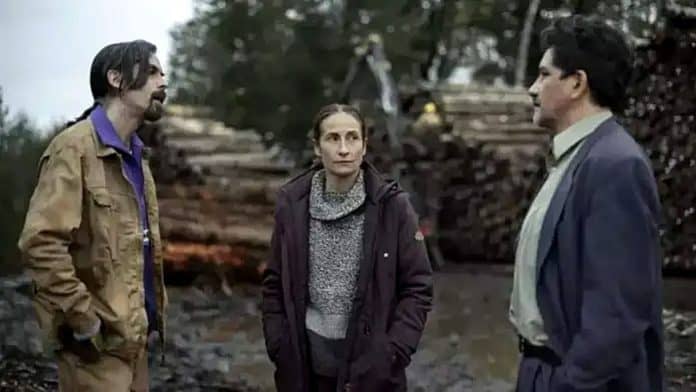42 Days in Darkness is a Chilean crime thriller series following the disappearance of Veronica Montes, who was last seen at her house in Altos del Lago. It is now streaming on Netflix.
Warning: This article contains heavy spoilers
Plot summary
The posh neighbourhood of Altos del Lago is stirred when Veronica Montes vanishes from her house. Her husband, Mario Medina reports her disappearance to the police, afraid that she might have been kidnapped after receiving an anonymous call from an unknown man and woman, threatening to hurt her.
He claims to have dismissed it as phone fraud until he got a worried call from his daughter on her way home from school, informing him that her mother had not picked her up.
With Chief Toledo leading the investigation, the police trace the call to an internet cafe and get a sketch prepared with the owner’s help.
Due to its unusualness in a place like Altos del Lago, the case garners some media attention bringing forth various theories, and forcing the police to declare the investigation secret. Doubting the police’s capability, Cecilia, Veronica’s sister enlists Victor Pizarro’s help to find her sister.
With Nora and Braulio, he works on his own investigation into the disappearance, during which he considers various theories including a potential elopement with a lover, a staged kidnapping and Mario’s possible involvement.
While analysing the family’s call logs, Nora realises that Mario hadn’t called his wife even a single time after she went missing. She also realises that the call that Mario claims his daughter made to him the day of his wife’s disappearance, does not exist.
Cecilia makes a public statement addressing her suspicions of Mario, who then claims that the man and woman in the call he had received were Cecilia and her husband.
At the authority’s request, a psychologist talks to Mario, after which he points out how Mario had only used the past tense when talking about Veronica. Meanwhile, the police bring trained dogs to help sniff out any clues they might have missed.
This seems to bother Mario. The next day, he reports the discovery of Veronica’s dead body, claiming to find it in his attic. An autopsy is conducted, suggesting her death was a suicide.
Still sceptical of the credibility of the autopsy years after the death, Victor Pizarro convinces Cecilia to carry out another examination of Veronica’s body. The analysis links the death to a toxic substance but fails to advance the case.
Years later, Pizarro identifies the man in the police sketch as Jaime Nunez Jara, with the help of an old client. After being arrested, Jaime confesses to Veronica’s murder for a price of 5 million pesos from Mario.
Mario is subsequently arrested on suspicion of hiring Jaime to kill his wife. However, Pizarro lacks the evidence he needs to convict Mario.
If you still have doubts about the ending, here’s a full breakdown.
42 Days of Darkness ending explained in detail: (Episode 6: Still In The Dark)
Is Jaime guilty?
Jaime’s confession confirms Pizarro’s theory of Mario’s involvement but is unable to prove it in front of the prosecution. Jaime’s conviction is based solely on the testimony of the internet cafe owner who saw the man who placed the anonymous call.
Unfortunately for Pizarro, he declines to give his testimony due to uncertainty about the caller’s identity. He does not wish to be responsible for Jaime’s life as he is unsure whether he was the caller.
Jaime backs off from testifying in court making his confession of being paid by Mario, invalid. Due to the lack of evidence required to link Jaime and Mario, the latter walks away without being convicted. Meanwhile, Jaime is sentenced to homicide and robbery.
Jaime’s testimony against Mario
Despite the lack of evidence, Pizarro still believes that Mario was somehow involved in his wife’s murder. Finding Jaime’s sudden decision to not provide his testimony against Mario strange, he investigates Jaime.
Pizarro finds that Jaime has a daughter which might have been the reason for his withdrawal from testifying.
Pizarro is convinced that Mario paid Jaime a sufficient amount to ensure his daughter’s well-being. He believes that aware of his inevitable fate as a prisoner, Jaime must have chosen to not testify to protect his daughter’s future.
Despite Pizarro and Cecilia’s constant belief in Mario’s involvement, his daughters refuse to believe that their father had anything to do with their mother’s murder.
In the end
Pizarro was still convinced of Mario’s involvement but could not prove it in front of the prosecution due to a lack of evidence. Having no other choice, he moves on from the case.
Instead, he focuses on spending time with his son after his commitment to the case had harmed their relationship.
Cecilia is haunted by feelings of regret and guilt, wanting to change the past.
Meanwhile, Mario’s involvement in his wife’s murder is never confirmed and his daughters, Emi and Kari move on with their lives despite everything.
Also Read: Brotherhood season 2 summary and ending explained

